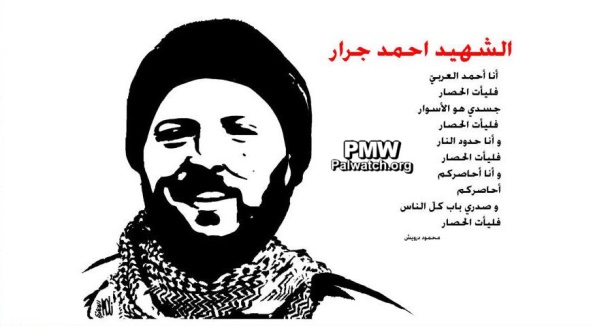Fatah Facebook post dedicates poem by Darwish to terrorist who killed an Israeli

Image posted on the website of the Fatah Commission of Information and Culture
Headline: “Ahmed the Arab”
The image shows terrorist Ahmed Nasr Jarrar, who led the murder of Rabbi Raziel Shevach.
Text on image: “Martyr (Shahid) Ahmed [Nasr] Jarrar
I am Ahmed the Arab
Let the siege come
My body is the walls
Let the siege come
And I am the borders of fire
Let the siege come
I am the one that surrounds you
Surrounds you
And my chest is the gate of all of the people
Let the siege come
Mahmoud Darwish”
Click to view bulletin
Ahmed Nasr Jarrar – Palestinian terrorist who led the terror cell that murdered Rabbi Raziel Shevach in a drive-by shooting on Jan. 9, 2018, near Havat Gilad, in the Nablus area. Jarrar was shot and killed during an exchange of gunfire with Israeli soldiers while resisting arrest near Jenin on Feb. 6, 2018.
Mahmoud Darwish is considered the Palestinian national poet. He published over 30 volumes of poetry and 8 books of prose and has won numerous awards. He joined the Israeli Communist Party in 1961 and the terrorist organization PLO in 1973, becoming a member of the PLO Executive Committee in 1987. He left the PLO in 1993 because it signed the Oslo Accords with Israel.
Many in Israel see his poetry as inciting hate and violence. One poem he wrote in 1988 at the height of the Palestinian wave of violence and terror against Israel (the first Intifada, 1987-1993) calls to Israelis: “Take your portion of our blood - and be gone… Live wherever you like, but do not live among us… Die wherever you like, but do not die among us… Leave our country, our land, our sea, our wheat, our salt, our wounds, everything, and leave the memories of memory.”
In 1964, he wrote a poem entitled "ID Card" in which he said: "I do not hate people, And I do not steal from anyone, But if I starve I will eat my oppressors' flesh; Beware, beware of my starving, And my rage."
He also wrote “Silence for the Sake of Gaza” in 1973, which many see as glorifying terror: “She wraps explosives around her waist and blows herself up. It is not a death, and not a suicide. It is Gaza's way of declaring she is worthy of life.”
His defenders have claimed that Israel misinterprets his poetry and that he sought reconciliation with Israel. One wrote in 2017: “Darwish arranged meetings between Palestinian and Israeli intellectuals, and published essays on their discussions. He was optimistic that, through mutual understanding, the two sides could eventually reconcile.” [https://www.bcalnoor.org/]
» View analysis citing this item